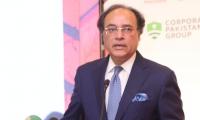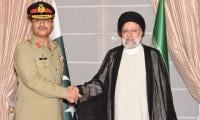Considerable damage has been done to higher education in the last three years because of the one-sided policies of the last chairperson, most of which were bulldozed through without taking any stakeholder on board through a consultative process.
Such policies will destroy both the undergraduate and graduate academic programmes, as well as research in the country, and must be immediately suspended by the incoming chairperson when he/she takes charge.
In addition to the changes made to the academic curriculum (‘Higher education ravaged’, The News, April 7, 2021), hardly 25 percent of the PhD scholarships and post-PhD fellowships were awarded to deserving candidates, which will have a negative impact on future university growth and development of required talented manpower in many emerging areas and technologies (‘HEC woes’, April 2. 2021).
Research was severely curtailed, which will make Pakistan fall from grace from a leading research position, when its impact on the quality and number of publications will be felt in the next few years. As a result, the ranking of Pakistani universities will fall to embarrassing low levels, where both the number of PhD faculty and research publications count significantly.
How can we move forward on a war footing to undo the damage caused to our higher education system? Foremost of all, a qualified individual with the right experience, vision and integrity must be appointed as HEC chairperson. The HEC Ordinance requires the chairperson “to be a person of international eminence and proven ability who has made significant contribution to higher education as teacher, researcher or administrator.” The Controlling Authority (currently the prime minister of Pakistan) has the power and the discretion of appointing the chairperson directly without a selective process, as was done for the first two chairpersons. (The next two were appointed by the PML-N government through a sham selection process, as covered in ‘Search for the HEC head’, The News, April 15, 2021).
Clearly it will be a major uphill task to put the HEC on its feet again. Having served as the second chairperson, the following, in my opinion, are the minimum reforms required as a way forward for the HEC to pick up the pieces and stand tall again.
Quality education: Focus on quality education at both the undergraduate and graduate level so our universities are recognized and ranked globally. Meet global standards of curriculum: 124+ credit hours (CH) for the Bachelor’s degree, 30+ CH for the Master’s degree, and 42+ CH for the PhD degree (beyond the Master’s degree, which must be a requirement for getting into the PhD programme). In addition, all candidates must be required to pass the qualifying and comprehensive exams, have at least one research publication in an HEC recognized journal, and a review of the dissertation by at least two foreign examiners from any of the top (500) universities of the world.
The academic curriculum must include at least one Coding course at the freshman level for all science-based students. The Qualification Framework must be strengthened and based on learning outcomes, not years. Quality Enhancement Cells (QEC) and the Institutional Effectiveness Offices (IEO) must be research based, reporting directly to the VC. Accreditation Standards must be revised conforming to global Accreditation Councils (AC) requirements, like AACSB and ABET. No university should be allowed to start a new programme, unless approved by the AC. A review of every academic programme by the AC must take place every three years.
Faculty development: PhD scholarships, foreign and domestic, in emerging areas and technologies must be restored immediately at the previous high levels. Also restored must be the split PhD and the postdoc programmes in developed countries, particularly for those who have received their PhDs from Pakistani universities. Pakistan needs another 10,000 PhDs in the next five years to cope up with university and enrollment growth.
Research: R&D funding must be increased by at least 50 percent of its past highest levels. New centers of research must be established in priority areas, such as in AI, Cyber Security, Data Sciences, Biotechnology, etc and more domestic PhD scholarships and post-docs must be offered at these centers.
Innovation and entrepreneurship: The HEC, jointly with other business groups, must organize business competitions at the national level. The winners must be supported to participate globally. The capacity of the Offices of Research, Innovation and Commercialization (ORIC) must be strengthened to organize such events on a regular basis. Business Incubators, and Science and Technology Parks must be established at each major university.
New universities: At least one world-class skill-based federal university must be established in each province, along the pattern of the Pak Austrian Fachhochschule established recently in Haripur Hazara by the Khyber Pakhtunkhwa government. No new public university must be established by the provinces till PhD faculty in each provincial university reaches at least 40 percent. All new public universities must then be opened first as sub-campuses of existing universities till they independently demonstrate the capacity to perform. The land requirement criteria must be reduced for private universities.
Criteria and procedure for appointment of vice chancellors: The HEC must develop a criterion for appointment and term renewal for VCs which must be approved by all chancellors.
The HEC is a role-model institution and a strategic organization. The PM must take charge of the HEC as the Controlling Authority and bring the status of higher education back to its glory days.
The writer is a former chairperson of the HEC.
An aeroplane of the national flag carrier of Pakistan is seen in this file photo. — AFPWhile Pakistan considers...
Representational image of a graph depicting various variables. — APP/FileInitiated by the centre and fiercely...
In this picture taken on April 16, 2023, people throng a market area during shopping in Lahore. — AFPOne of the...
Honour crimes also target men. In Sikandar Ali Lashari vs The State, SHC upheld conviction passed by ATC for honour...
If Sindh earmarks Rs20 million per police station, it will cost only Rs10 billion to make them effective first...
A complex and difficult policy environment seems to be highlighted by US’s recent application of sanctions on...







